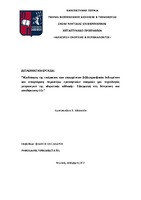Αξιολόγηση της επάρκειας των υπαρχόντων βιβλιογραφικών δεδομένων και αναγνώριση περαιτέρω ερευνητικών αναγκών για τεχνολογίες μετριασμού της κλιματικής αλλαγής – Εφαρμογή στη δέσμευση και αποθήκευση CO2

Προβολή/
Λέξεις κλειδιά
Κλιματική αλλαγή ; Μετριασμός κλιματικής αλλαγής ; Αξιολόγηση τεχνολογικών αναγκών ; Ανάγκες αξιολόγησης ; Δέσμευση και αποθήκευση άνθρακα ; Climate change ; Climate change mitigation ; CCMOs ; Technology needs assessment ; TNA ; Research priorities ; Assessment needs ; Sustainability assessment ; Carbon capture and storage ; CCSΠερίληψη
Η κλιματική αλλαγή έχει εμφανή αποτελέσματα στην άνοδο της θερμοκρασίας και της στάθμης της θάλασσας και σοβαρό αντίκτυπο στην ακεραιότητα των οικοσυστημάτων, των υδάτινων πόρων, της δημόσιας υγείας, των γεωργικών καλλιεργειών, κλπ. Οι δράσεις για την καταπολέμηση της απαιτούν βιώσιμα και προσαρμόσιμα μέτρα για τη μείωση των εκπομπών των αερίων του θερμοκηπίου, τόσο σε παγκόσμια όσο και σε εθνική κλίμακα και η αξιολόγηση της βιωσιμότητας τέτοιων μέτρων είναι καθοριστικής σημασίας για την επίτευξη ενός πιο «πράσινου» μέλλοντος. Η μείωση των εκπομπών των αερίων του θερμοκηπίου μπορεί να επιτευχθεί μέσω διαφόρων επιλογών μετριασμού της κλιματικής αλλαγής, τεχνολογιών ή πρακτικών, οι επιπτώσεις των οποίων αξιολογούνται συχνά σε συγκεκριμένες διαστάσεις βιωσιμότητας, προκειμένου να δοθεί προτεραιότητα σε αυτές ανάλογα με τη δυνατότητα τους για μετριασμό. Πολλές μελέτες σχετικά με την τεχνολογική αξιολόγηση και την αξιολόγηση της βιωσιμότητας τέτοιων επιλογών έχουν δημοσιευτεί τις τελευταίες δεκαετίες. Η εκτίμηση της απόδοσης και των επιπτώσεων τους είναι ζωτικής σημασίας για την πραγμάτωση κλιματικών στόχων και την επίτευξη αποδοτικότερης έρευνας και καινοτομίας στον τομέα του μετριασμού της κλιματικής αλλαγής. Η παρούσα διπλωματική αποσκοπεί στην ανασκόπηση της υπάρχουσας βιβλιογραφίας σχετικά με τα κύρια μεθοδολογικά πλαίσια και τους δείκτες αξιολόγησης της απόδοσης των επιλογών μετριασμού της κλιματικής αλλαγής και στοχεύει στον εντοπισμό κενών γνώσης και ερευνητικών προτεραιοτήτων για μία αναδυόμενη, αλλά προς το παρόν αμφιλεγόμενη επιλογή μετριασμού, τη Δέσμευση και Αποθήκευση Άνθρακα (ΔΑΑ). Τα ευρήματά μας αναδεικνύουν πληθώρα υπαρχόντων μεθοδολογικών πλαισίων και δεικτών σε αυτόν τον τομέα και η παρούσα διπλωματική επιχειρεί να συνοψίσει την υπάρχουσα γνώση. Από την άλλη πλευρά, η Δέσμευση και Αποθήκευση Άνθρακα θεωρείται ήδη μία υποσχόμενη και ώριμη επιλογή με μεγάλες δυνατότητες μετριασμού. Τα ευρήματα της επιστημονικής βιβλιογραφίας ανέδειξαν ένα ετερογενές τοπίο ερευνητικών προτεραιοτήτων και αναγκών αξιολόγησης της, και ως εκ τούτου, περαιτέρω έρευνα απαιτείται για την ανάπτυξη της Δέσμευσης και Αποθήκευσης Άνθρακα (ΔΑΑ), η οποία πρέπει να δρομολογηθεί εστιάζοντας στη διευθέτηση της υπάρχουσας αβεβαιότητας και κινδύνων. Συνοψίζοντας, η παρούσα διπλωματική δεν αποσκοπεί να αναπαράγει την ερευνητική δραστηριότητα στον τομέα μετριασμού της κλιματικής αλλαγής, αλλά να αξιολογήσει την επάρκεια της διαθέσιμης πληροφορίας στη βιβλιογραφία με σκοπό να καταστήσει τα υπάρχοντα αποτελέσματα και ερευνητικά ευρήματα χρήσιμα για τελικούς χρήστες, εμπειρογνώμονες και ενδιαφερόμενα μέρη.


